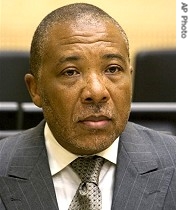-
(单词翻译:双击或拖选)
Dakar
03 July 2007
Liberia's former president Charles Taylor ended a boycott1 Tuesday of his trial for war crimes he is accused of committing during Sierra Leone' decade long civil war. Mr. Taylor had boycotted2 the trial, which began last month in The Hague, saying that his defense3 team was inadequate4 and he had no chance of a fair hearing. Kari Barber reports from VOA's West Africa bureau in Dakar.
 |
| Charles Taylor (2006 file photo) |
Taylor has pleaded not guilty to all 11 charges of war crimes and crimes against humanity which include murder, rape6, mutilation and the use of child soldiers during the brutal7 civil war in Sierra Leone.
Taylor is accused of backing the Revolutionary United Front (RUF) and other rebels in Sierra Leone - giving them guns, training and money in exchange for diamonds from the areas they controlled.
Netherlands-based researcher Stephen Ellis, author of a book on Liberia's civil war, says Mr. Taylor's appearance gives more credence8 to the special court for Sierra Leone.
Mr. Taylor's trial has been criticized for being held in Europe. The trial was moved to The Hague because of fears it could lead to renewed tensions within Sierra Leone and Liberia.
"It is going to give the court more legitimacy9 than it might have if he were to completely boycott the trial and on the other hand it also means he has some chance to defend himself," said Ellis.
Spokesman for the Freetown-based Special Court for Sierra Leone Peter Andersen says while it is encouraging that Mr. Taylor chose to participate, the case would have gone on regardless.
"For the administration of justice it has to be seen that the judges are in control of the court, so the process will continue," said Andersen. "If an accused can bring the process to a halt or claim to discredit10 the process by saying, 'I am not going to cooperate,' then you have a very big problem in the administration of justice."
Andersen says in all of the cases the special court has seen there have been times when defendants11 refuse to participate.
"It is not mandatory12. We do not drag a person in in chains," he said. "The judges will note that the person has waived13 his rights to be present and they will continue on until the person comes to court and in every case we have had so far the accused have eventually returned to court."
Mr. Taylor's case is scheduled to reconvene on August 20 to give time to put together a new defense counsel.
 收听单词发音
收听单词发音
1
boycott

|
|
| n./v.(联合)抵制,拒绝参与 | |
参考例句: |
|
|
|
2
boycotted

|
|
| 抵制,拒绝参加( boycott的过去式和过去分词 ) | |
参考例句: |
|
|
|
3
defense

|
|
| n.防御,保卫;[pl.]防务工事;辩护,答辩 | |
参考例句: |
|
|
|
4
inadequate

|
|
| adj.(for,to)不充足的,不适当的 | |
参考例句: |
|
|
|
5
Amended

|
|
| adj. 修正的 动词amend的过去式和过去分词 | |
参考例句: |
|
|
|
6
rape

|
|
| n.抢夺,掠夺,强奸;vt.掠夺,抢夺,强奸 | |
参考例句: |
|
|
|
7
brutal

|
|
| adj.残忍的,野蛮的,不讲理的 | |
参考例句: |
|
|
|
8
credence

|
|
| n.信用,祭器台,供桌,凭证 | |
参考例句: |
|
|
|
9
legitimacy

|
|
| n.合法,正当 | |
参考例句: |
|
|
|
10
discredit

|
|
| vt.使不可置信;n.丧失信义;不信,怀疑 | |
参考例句: |
|
|
|
11
defendants

|
|
| 被告( defendant的名词复数 ) | |
参考例句: |
|
|
|
12
mandatory

|
|
| adj.命令的;强制的;义务的;n.受托者 | |
参考例句: |
|
|
|
13
waived

|
|
| v.宣布放弃( waive的过去式和过去分词 );搁置;推迟;放弃(权利、要求等) | |
参考例句: |
|
|
|















